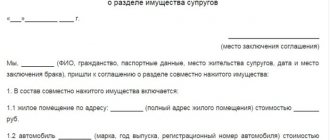Source: Group.
Increasingly, divorce is becoming the only solution to resolving family conflicts. According to Rosstat, the number of divorces has been increasing in recent years, and their number in relation to marriages in 2013 was approximately 50%.
These disappointing statistics suggest that every year several hundred thousand separated couples are faced with the issue of dividing property and are forced to understand the complex legal issues associated with this process: in what time frame the property needs to be divided; what property is subject to division; Is it necessary to go to court? does a marriage contract save you from division of property, etc. We will try to answer these and many other questions further.
Who owns property acquired during marriage?
The law provides for two property regimes for a couple who have registered a marriage:
- law;
- negotiable.
Legal regime.
As a general rule, all property acquired during marriage is the joint property of the spouses. This means that both husband and wife have equal rights to the property, no matter in whose name the title is registered. For example, a car was purchased during marriage and registered in the husband’s name. In this case, the wife has the right to use the car on an equal basis with her husband, and the husband can dispose of (sell, donate, etc.) this car only with the consent of the wife. To common property in accordance with Part 2 of Art. 34 of the RF IC include, in particular:
- income received as a result of labor, entrepreneurial and intellectual activities;
- pensions, benefits, other payments that do not have a special purpose;
- movable and immovable things purchased with common money, etc.
What if the marriage is not dissolved, but the spouses live separately and do not have a common budget?
Property acquired during a registered marriage, despite separation, is still considered joint property. And only the court can establish that those things that were acquired by each of the spouses during the period of separation are the property of each of them.
Example.
The Moscow City Court refused to satisfy the claims for recognition as joint property - rent payments that were received by the defendant during the period when he and the plaintiff no longer had a family budget, but the marriage was still registered (appeal ruling dated October 2, 2013 according to case No. 11-24680).
Consent of the spouse to a transaction for the disposal of common property. To sell, donate or otherwise dispose of joint property, the consent of both spouses is required.
The notarized consent of the spouse to complete the transaction is required in the following cases:
- real estate transaction;
- the law requires notarization and/or registration of the transaction.
In all other cases, it is not necessary to obtain documented consent; the law emphasizes that the consent of the second spouse is assumed.
But, unfortunately, spouses are not always honest with each other, and one of them can dispose of common property without the consent of the other. What to do in this situation? How to protect your rights?
When your spouse disposes of property against your will, you must go to court to invalidate the transaction by which this property was transferred to another person. To do this, you will need to prove that the second party who acquired the property knew or should have known that the other spouse did not agree to the transaction.
Example.
The wife went to court to invalidate the contract for the sale of vehicles concluded by her husband. At the same time, she referred to the fact that her husband did not receive notarized consent from her to sell the car. But the court pointed out that such a transaction does not require obtaining notarial consent, since this agreement does not need to be certified by a notary or registered. In addition, the court noted that in making such a claim, the spouse had to provide evidence that the buyer of the car should have known or knew that she opposed the sale. But the spouse did not provide such evidence, so the Moscow City Court refused to satisfy her demands (Appeal ruling dated March 20, 2014 in case No. 33-2336).
Contractual regime. This regime involves the conclusion of a marriage contract, which must be certified by a notary. If a couple chooses such a property regime, then the property that is acquired during the marriage relationship is no longer considered joint, but is distributed between the spouses in the manner and amount determined by the marriage contract. If desired, a married couple can enter into a prenuptial agreement both before marriage and during family life.
The agreement can provide for separate, shared or joint regimes for all property, its individual types or for the property of each spouse.
If you want to own not only the property that you own at the time of concluding the contract, but also that which will be acquired in your name during the marriage, then this condition must be reflected in the contract. The law allows the marriage contract to extend to property that will be purchased in the future.
When concluding a marriage contract, it is worth complying with the requirements of the law, since the court may declare the contract invalid, for example, if it is proven that its terms put one of the spouses in an extremely unfavorable position.
Example.
The spouse received significantly less property under the marriage contract than the wife. According to this document, the wife received 2 plots of land, a residential building and 3 apartments. And according to the prenuptial agreement, during the divorce, the husband was left with only the car and money, which would be in the bank account during the divorce. But by the time of the divorce, he had sold the car and spent the money on his family, but there were no other funds in the account. Taking into account this unequal position of the spouses, the court declared the marriage contract invalid (Moscow City Court, appeal ruling dated April 30, 2013 in case No. 11-17943).
If, according to a marriage contract, all the property of a married couple is divided or registered as shared ownership, then there is no longer a need for division of property. This is one of the advantages of the contractual regime. After all, a pre-formed agreement between spouses regarding property rights significantly reduces the risk of conflicts arising in the future regarding this issue.
Legal grounds
When resolving issues related to the ownership of property acquired during marriage, the parties are guided by the norms of the RF IC. Art. 38 determines that spouses have equal rights and obligations regarding jointly acquired property. This means that during marriage they use property together, and in case of divorce they can divide it in equal shares.
The question of what specifically relates to jointly acquired property is addressed in Art. 34 RF IC. This article of the Family Code establishes that all property acquired during marriage will be considered such, provided that the married couple bought it with funds belonging to both. This norm is also enshrined in Art. 256 of the Civil Code of the Russian Federation.
What property does not need to be divided?
Not all property acquired during marriage belongs to the community. According to the law, property belongs exclusively to one spouse and is not subject to division if:
- the property was given to the spouse free of charge, for example, as a gift, by inheritance or through privatization;
- property is of an individual nature (clothes, shoes, etc.), with the exception of jewelry and luxury items;
- the right to the results of intellectual activity.
Based on judicial practice, it should be borne in mind that not all property received free of charge by one of the spouses during marriage is his personal property.
According to the law, in this case we are talking about property that was transferred to the spouse as a result of the transaction. Therefore, it is impossible to classify as the property of one of the spouses property that was received free of charge on the basis of an act of a public authority. Such property, taking into account other circumstances (family composition, purpose of property, contents of the act), can be recognized as joint property. In addition, things purchased for children will also not be shared, but will go to the parent with whom the child remains.
It should be noted that property that is the property of one of the spouses (received free of charge during marriage or acquired before marriage), the court, at the request of the other spouse, may classify as community property. To do this, it is necessary to prove that during the marriage relationship the value of this property was significantly increased due to:
- common property;
- property of each spouse;
- labor of one of the spouses.
Example.
The husband submitted demands for recognition of the residential building received by his wife as a joint property. The wife inherited a house, the condition of which was improved during marriage. The husband in court outlined in detail the entire list of work he had carried out on the reconstruction and major repairs of the house. The court was also presented with a certificate that reflected the value of the house at the time of its acquisition, and a report on its market value at the time of going to court. Also, in order to prove his words, the husband invited witnesses who confirmed the fact that repair work was carried out during the marriage. At the same time, the court noted that home ownership represents all the property that is located on a land plot, including a residential building, as well as outbuildings. Satisfying the husband's demands for recognition of a residential building acquired by his wife by inheritance, the court took into account the improvements made not only in relation to the residential building, but also outbuildings (Appeal ruling of the Volgograd Regional Court dated March 28, 2014 No. 33-1457/2014)
How to manage joint property?
The disposal of common property occurs by mutual agreement. A husband and wife can own and use it by agreement, but sales and other transactions will require the notarized consent of the husband or wife (Article 35 of the RF IC). If you sell or donate a car purchased during marriage without the permission of your spouse, he has the right to challenge the transaction in court within 1 year from the moment he became aware of it.
Example:
A married couple bought a car with common money. The title indicates a man as the owner, and the car is registered in his name. However, this does not cancel his wife's rights to the vehicle. If she has a driver's license, she can drive a car on the same basis as her husband, acting by agreement.
State duty on division of property of spouses
Statement of claim for division of jointly acquired property of spouses
Is it necessary to divide property during a divorce?
Property can be divided not only simultaneously with the filing of a divorce, but also before this moment, as well as after the dissolution of the marriage.
It is necessary to take into account some features of the division of property before and after divorce.
When dividing property even before a divorce, it is necessary to remember that the property that remains undivided, as well as that which will be acquired after the division, belongs to joint property. And if it comes to divorce, then this property will have to be divided.
If, when filing a divorce, you do not want to deal with issues of division of property yet, then it is worth remembering the statute of limitations. The law provides the opportunity to apply for partition within 3 years. Moreover, this period begins to run not from the moment you filed for divorce, but when you learned or should have learned about the violation of your rights. What does this mean? Let’s assume that after a divorce, you and your spouse still have a shared apartment, but you didn’t want to live in it and found another place to live. For 5 years after the divorce, you did not try to use your right to live in this apartment, and after this period, when trying to use this right, the second spouse began to interfere with you. In this situation, it turns out that you learned about the violation of your right to live in a joint apartment only 5 years after the divorce. Therefore, you have every right to go to court to divide the apartment.
Example.
After the divorce in 2007, the former spouses still had a residential building in joint ownership, but the wife did not go to court for a long time to divide the property and did not live in this house. And after 6 years (in 2013), the ex-husband wanted to deprive the ex-wife of the right to use this house by court. In response to such demands, the ex-wife asked the court to recognize the house as joint property and allocate her a share in this property. Despite the fact that much more than 3 years had passed since the divorce, the Omsk Regional Court indicated that the woman only learned about the violation of her rights (the right to use the house) when her ex-husband tried to deprive her of the right to use the house in 2013. Therefore, the statute of limitations has not expired (Appeal ruling dated April 16, 2014 in case No. 33-2055/2014).
Despite the fact that the law establishes that the statute of limitations does not run from the moment of divorce, it is nevertheless better not to delay the division of property after the dissolution of the marriage. After all, if more than three years pass after the divorce, you will have to prove in court the fact that you did not know about the violation of your rights for a long time.
Housing section
The living space is also divided in proportion to the shares of the spouses . However, this also takes into account the size of the living space, the purpose and quality of the premises.
Therefore, dividing real estate into absolutely equal parts is impossible .
If, as a result of the division, one party receives such a small part of the living space that it cannot be allocated, the court decides to leave the entire living space to the second party and award compensation in favor of the spouse left without housing.
After full receipt of compensation, the former owner will be obliged to vacate the home.
The division of unfinished premises is carried out according to the same rules.
What methods of dividing property are there?
The law distinguishes two options for dividing property:
- by agreement of the spouses, by concluding an agreement;
- through the court.
An agreement between spouses on the division of property is a simple written document, which, unlike a marriage contract, is certified by a notary only at the request of the couple.
It is also possible to divide not all family property, but only part of it. Everything else will remain joint property. The judicial procedure is more complex and lengthy. When choosing it, the couple risks spending a lot of time, nerves and money. If you and your spouse cannot agree on a division, then you need to determine which court will hear your dispute. Claims whose price does not exceed 50 thousand rubles must be addressed to the magistrate’s court. If the price is higher, then the district court will consider the case. As a general rule, cases are heard in court at the defendant’s place of residence. But when a dispute arises over real estate, it is necessary to go to court at the location of the property. In addition, you will have to calculate and pay a state fee, the amount of which will depend on the value of the property being divided. Also important is the collection of documents that will confirm ownership of the disputed property.
It should be taken into account that, both by agreement and in court, property can be divided both before and after divorce.
When can personal property be recognized as joint property?
If the spouses wish, they can recognize personal property as joint property by introducing a similar clause into the marriage contract. In this case, they determine the size of the shares independently at their own discretion.
If the division is carried out by law through the court, personal property is recognized as joint property only if one condition is met: it was significantly improved during the marriage. And the funds for its improvement were taken jointly, belonging to both spouses. Or they were completely the personal property of the spouse who is not listed as the owner.
If property is transferred from personal to joint, this does not mean that it is divided equally. The size of the shares will be determined in accordance with the funds invested in the improvement.
The division of jointly acquired property in court is carried out in equal shares. The spouses themselves can implement it through a written agreement in any ratio, if this does not contradict the current legislation.
How is property divided?
Typically, property is divided in equal shares. But sometimes the court may award one party a larger share of the family property. The following circumstances may serve as the basis for this decision:
- taking into account the interests of minor children;
- lack of income for one of the spouses for unjustified reasons.
Example.
In one case, the Moscow City Court indicated that cohabitation with one of the former spouses of minor children in itself is not a basis for deviation from equality of shares and an increase in the share in the common property for the spouse with whom the children live (2 minor children lived with the plaintiff, appeal ruling dated March 18, 2014 in case No. 33-8089). In another situation, the Primorsky Regional Court awarded the ex-wife ¾ of the share of the total property. At the same time, the court took into account the fact that 5 minor children remained living with her, she herself does not work, but is on maternity leave (Presidium Resolution No. 44g-38 of April 22, 2013).
When the division occurs in equal shares, but it is not possible to divide the property equally, the spouse can count on compensation from the second spouse.
In conclusion, I would like to note that just as the relationship of each married couple is unique, so does its separation and the issues associated with it have its own characteristics. Despite the fact that the law contains general rules for the division of family property, in a specific situation they can be interpreted differently. The same facts, which the court in one situation considers insufficient to satisfy the claim, in another situation, in the presence of additional circumstances, the court may take into account. Therefore, before making a decision regarding the division of property and building tactics for its management, it is advisable to consult with a specialist.
Definition of shares
The division of property does not always occur in equal shares . The change in share may be affected by:
- serving in the army;
- serving a sentence in prison;
- the presence of children under 18 years of age who will live with their father or mother;
- other factors.
Having determined the size of the share of each spouse, the court proceeds directly to the division procedure , as a result of which the parties receive ownership of property , the monetary equivalent of which is proportional to the established share.
Indivisible things are transferred to one of the parties, while the other receives compensation in the form of money or other things.
When assigning monetary compensation based on the financial situation of the payer, a payment schedule is drawn up .
Compensation is not due for the child’s property - it is completely transferred to the spouse (in excess of his share), with whom the minor will live.
Such property includes not only things registered in the name of the child, but also clothes, toys, sports equipment, furniture, and equipment purchased for him.
Legal regime of marital property and marriage contract
If a marriage contract is drawn up, instead of a legal one, a contractual regime operates in the family. The agreement regulates only property relations between the parties. It can be concluded before registration or during marriage. In the first case, it will begin to operate from the moment of state registration.
The contract must be certified by a notary.
It has several pros and cons:
| Advantages | Flaws |
| If there is an agreement, the property is divided according to its provisions. There is no need to draw up a separation agreement or go to court | Psychological point: many believe that drawing up a marriage contract is selfish and indecent |
| The contract allows you to determine in advance who owns what values and avoid their division | Costs for notary services |
| Resolving issues with loans: you can indicate that the debts belong to a specific spouse | Difficult legal regulation: it is impossible to provide for everything in a contract unless you contact a good lawyer |
| You can specify mutual maintenance responsibilities during marriage and after divorce | Possibility of challenge: a spouse whose property situation is worsened by the terms of the contract has the right to challenge it in court |
| Transparent financial and property relations between the parties |
Legal advice: if both parties agree, it is better to conclude a prenuptial agreement. It will allow you to avoid disputes over property and determine in advance who gets what. If there is a contract, in the event of separation there will be no need to go to court for division: everything is divided according to its provisions.
Elena Plokhuta
Lawyer, website author (Civil law, 7 years of experience)
Lawyer's answers to popular questions
Which is better: a separation agreement or a prenuptial agreement?
Legally, these are completely different documents. The agreement is drawn up after the divorce, while the contract is concluded before. By law, an agreement applies for partition.
I want to divide common property through the court. How much to pay in state fees?
The amount of the state duty is established by Art. 333.19 of the Tax Code of the Russian Federation and depends on the value of the dividend:
- Up to 20 thousand rubles. – 4%, minimum 400;
- From 20 to 100 thousand rubles. – 3%+800 rub.;
- From 100 to 200 thousand rubles. – 2%+3 200;
- From 200 thousand rubles. up to 1 million – 1%+5,200;
- Over 1 million – 0.5%+13,200.
The maximum amount does not exceed 60,000 rubles.
Who will own the money donated for the wedding?
Here everything depends on the will of the donors. To donate money, it is not necessary to formalize the deed of gift in writing. If the funds were transferred to both, then they belong to them in equal shares.
What to do if a house was built with common money, but it was not completed at the time of division? How to divide everything?
You can demand compensation for half of the money spent, or vice versa - keep the house for yourself, but pay the money to the other party.
I want to draw up a contract with my wife and indicate that all the property will go to me if a divorce occurs due to her infidelity?
No. A prenuptial agreement regulates property, not personal relationships, which include adultery. In addition, such a situation will put the wife at a disadvantage, and the notary will most likely refuse to certify the document.









